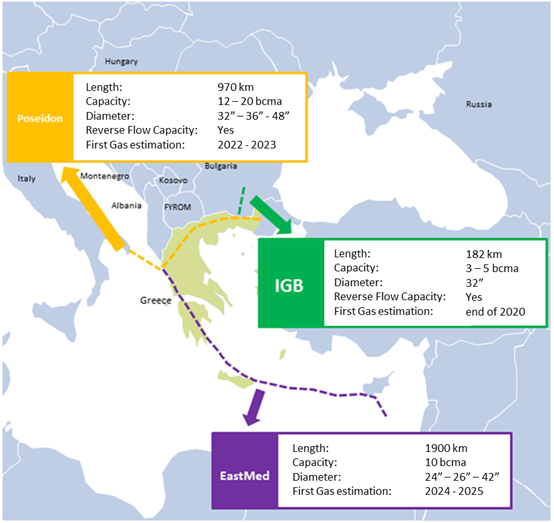Interconnector Greece – Bulgaria (IGB)
The IGB project consists of an 182 km length pipeline (of which approximately 31 km are on Greek territory), with associated support facilities (Metering Stations, Valve Stations, Operation Center). The Interconnector IGB will start in Komotini (Greece) and end in Stara Zagora (Bulgaria). The IGB Pipeline will therefore act as a strategic gas transportation infrastructure providing diversification of gas supply to the Bulgarian and South East Europe gas market and supply security to Greece. The 32” diameter pipeline is designed to have an initial 3 billion cubic meters (bcm) annual capacity which may be expanded up to 5 bcm per year. The IGB offers reverse flow capacity and a connection with the Trans-Adriatic Pipeline (TAP) is foreseen.
The project is developed by “ICGB AD”, a company established on January 5, 2011 and located in Sofia, with a mission to design, construct and operate the pipeline. The ICGB is a JV between the Bulgarian Energy Holding (BEH) and the Greek IGI Poseidon S.A. DEPA and Edison each hold a 50% stake in IGI Poseidon S.A.
The IGB enjoys the total support of the Greek and Bulgarian Governments and for both countries it is a project of national importance and public interest (Greece: Law 4001/2011, Article 176, Bulgaria: Bulgarian Cabinet Decision No 452 of 07.06.2012). In order to ensure its swift realization Greece has included the IGB in its national list of fast track projects. Endorsed by the EU, the IGB is a Project of Common Interest (PCI) and a priority project of the Central and South Eastern Europe Gas Connectivity Initiative (CESEC).
In 2018, the European Commission confirmed that plans supported by Greece and Bulgaria, to support the construction and operation of a natural gas interconnector - including a fixed corporate tax regime - are in line with EU State aid rules. The IGB will also benefit from a 45 million euro contribution from the European Energy Program for Recovery (EEPR) and a direct financial contribution from the Bulgarian Operational Program Innovation and Competitiveness. Furthermore, the Regulatory Authorities of Greece and Bulgaria, with the approval of the European Commission, granted the IGB an Exemption from Third Party Access rules (TPA Exemption) and other provisions of the Third energy package.
The IGB’s Final Investment Decision was taken on 10 December 2015. In March and May 2019, and following the respective international tender process, tenders were awarded regarding the contracts for the Owner’s Engineer - which includes services regarding the management, supervision and Third Party Inspection (TPI) - for the manufacture and supply of line pipes for construction as well as for the EPC (Engineering, Procurement and Construction).
On May 22 2019, the IGB’s Groundbreaking ceremony took place in Kirkovo, near the Greek-Bulgarian border, and construction works are scheduled to start in earnest during the summer of 2019.
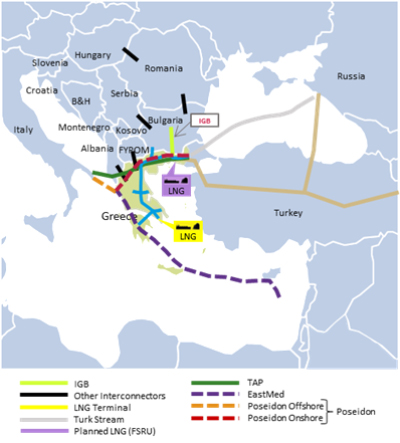


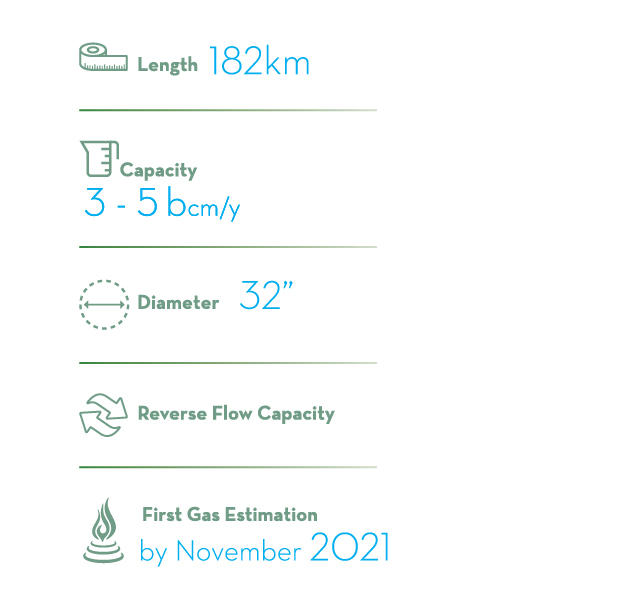
The Eastern Mediterranean Pipeline (EastMed)
EastMed will connect the recently discovered gas fields in the Eastern Mediterranean Basin with mainland Greece and is designed to carry initially 10 bcm/y of natural gas to Greece and Europe. The approximately 1900 km long pipeline runs from the offshore fields to Cyprus and to Greece, following a route through the Peloponnese, Western Greece up to the shore of Thesprotia and, via the Poseidon pipeline, all the way to the Italian gas system. The connection to Poseidon, enables the EastMed to deliver additional diversified gas sources from the Levantine basin to the heart of Europe, enhancing the integration of the EU market.
Since the end of July 2014, the Project is being developed by DEPA’s subsidiary company, IGI Poseidon, in which Edison holds a 50% share. The EastMed is designated as a project of national importance of Greece and a priority project of Italy. Endorsed by the EU, the EastMed is a Project of Common Interest, included since 2013 in the EU PCI list and benefitting from the fast-track procedures provided by EU Regulation 347/2013.
The EU supports the project’s development activities with co-funding from the Connecting Europe Facility (CEF). In 2015, it approved a grant of up to €2,000,000 for the Pre-FEED stage and in 2018 a grant of up to 34.5 million € for the FEED stage. The Pre-FEED studies that were finalized in March 2018, confirmed that the EastMed is technically feasible, economically viable and commercially competitive. Its added value, as a project that is complementary with other export options developing the East Mediterranean Corridor, was underlined.
The success of the Pre-FEED has allowed IGI Poseidon to proceed to the next development stage that includes a detailed design (FEED), detailed marine survey activities (DMS) and all the engineering details for project implementation, as well as the permitting activities. The EastMed strengthens the EU’s energy security goals by enhancing diversification of routes and sources and is complementary with other export options developing the East Mediterranean Corridor.
Apart from the EU, the development of the EastMed Project is also supported by the countries concerned by the Pipeline. Toward this, at the end of 2018, Cyprus, Greece, Israel and Italy, completed negotiations on an Intergovernmental Agreement (IGA) to support the realization of the EastMed. The IGA, regarding the support of the Parties for the realization of the EastMed pipeline, which has been checked by the European Commission, is expected to be signed during the second half of 2019, following the approval of the European Commission.
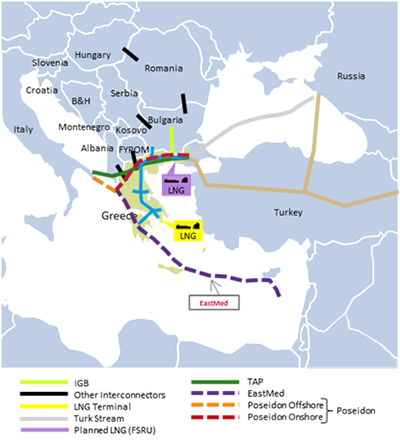


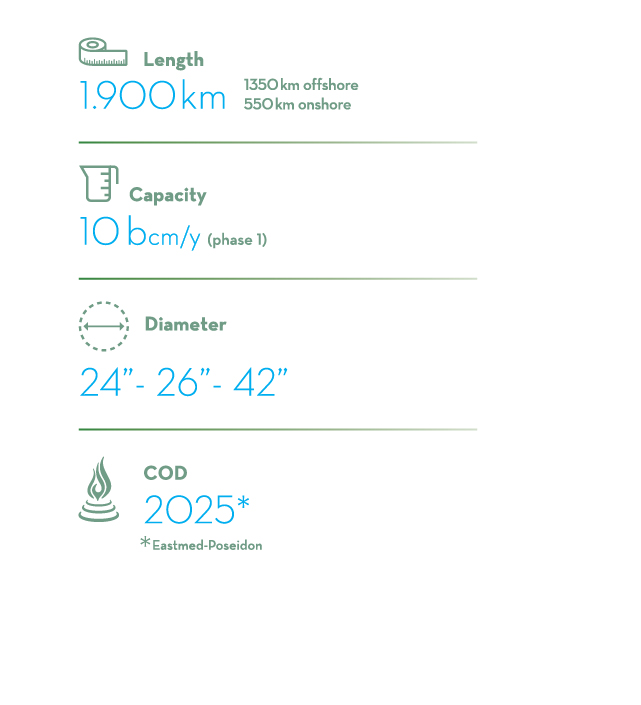
The Poseidon Pipeline Project
The Poseidon pipeline project, which is developed by the Greek company IGI Poseidon S.A. (50% DEPA – 50% Edison), consists of two sections: The approximately 760 km onshore section, whose route crosses through Greece from the Greek-Turkish border at Kipi to Florovouni in the Thesprotia region, and the approximately 210 km offshore section that connects the shores of the Thesprotia region to the vicinity of Otranto in Italy.
The Poseidon pipeline is designed with an initial capacity of 12 billion cubic meters (bcm) annually for Italy, with the possibility to upgrade up to 20 bcm per year, in order to carry natural gas as it becomes available at Greece’s borders. The Poseidon Pipeline enhances Europe’s energy security by connecting and integrating European markets and diversifying routes and sources with gas from the Caspian, the Middle East and the Eastern Mediterranean Basin.
The offshore section of Poseidon pipeline is already included in the European Union Projects of Common Interest list (PCI list) and benefits from the fast track procedures provided by the EU Regulation 347 of December 2013. Various studies have been co-financed by the TEN-E and the European Energy Program for Recovery (EEPR) funds.
The promoters have already obtained all mandatory authorizations to build and operate the offshore section of Poseidon project in Italy while in Greece permitting is being finalized. The Poseidon Pipeline is being developed in compliance with EU policies, in line with standards of major international cross-border natural gas projects. The Final Investment Decision is expected to be taken in 2019. Based on the current timetable, the completion and the commercial operation date of the Poseidon pipeline is expected in late 2022 – early 2023.
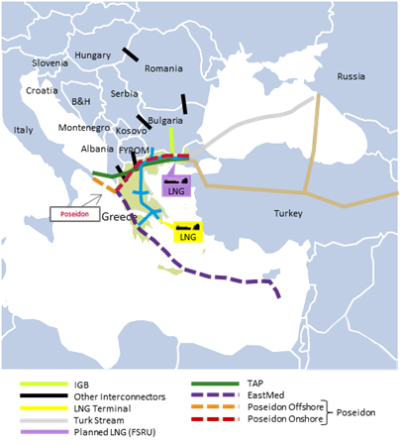


In 2018, IGB, EastMed and Poseidon were included in the Ten-Year Network Development Plan (TYNDP) of the European Network of Transmission System Operators for Gas (ENTSOG), since each one of them constitutes a significantly progressed and advanced Project.
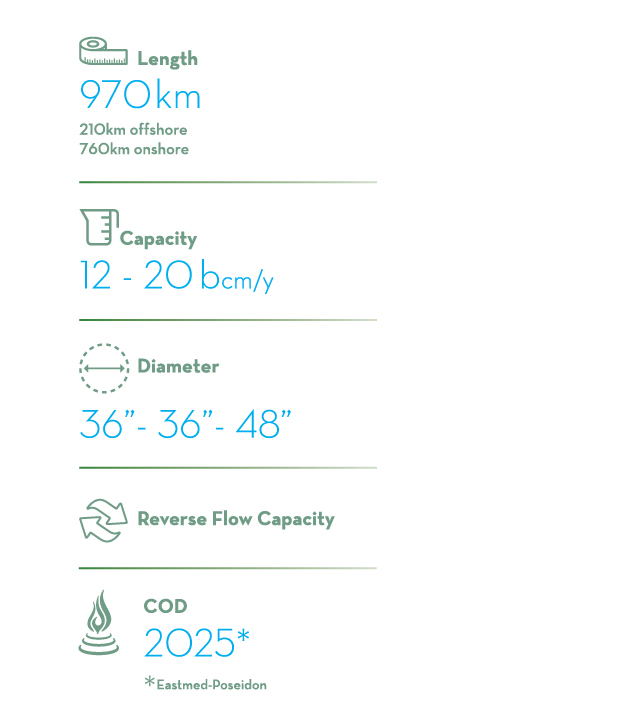
Other International Activities
DEPA is continually engaged in dialogue, exploring further avenues of cooperation with producers of natural gas, as well as of other innovative forms of gas, with a view to ensuring uninterrupted, sustainable and competitive energy supply for the Greek and regional markets.
Moreover, DEPA closely follows global trends, working with stakeholders to shape relevant developments in European and regional markets, and actively seeks strategic partnerships to promote new international initiatives of common interest.
DEPA has a long-standing experience and a solid track record in securing and managing European funding for the development of its Projects. Since 2018, DEPA has actively promoted research and development for innovative technologies, establishing new data and broadening prospects in the energy sector, at the national and international level.
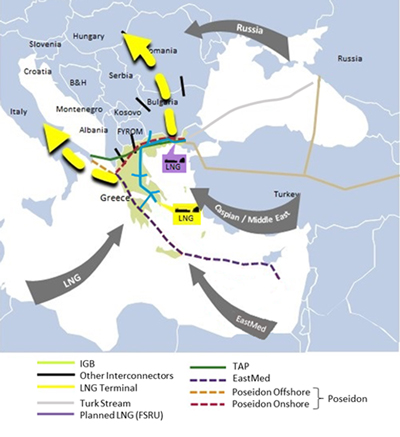
Technical features
